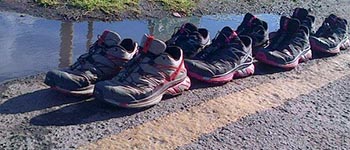
For the four volunteers from the university who are currently on their way to the Cape on foot, every hour of every day is a victory.
It is three weeks since two employees from the University of the Free State (UFS), Adéle van Aswegen and Ntokozo Nkabinde, together with two other Bloemfontein residents, Nico Piedt and Ronel Warner, left Bloemfontein on fóót for the Cape, in order to highlight the problem of food insecurity among students.
On Sunday 18 May they crossed the halfway mark at Beaufort West and will conclude their journey on Tuesday 3 June in Cape Town.
This is what the hikers have to say after three weeks on the road:
Adéle van Aswegen
It isn’t only a physical journey, but rather an emotional journey you undertake. You learn what it means to be truly thankful for basic things like clothes, a place to sleep and food.
Nico Piedt
I know what it feels like to survive on only a glass of water in your stomach – a cup of weak tea if you’re lucky – for the whole day. If I can help (through the hike) to give someone a better chance in life, then it is worthwhile.
Ronel Warner
You think and grow simultaneously. As you plan every stride ahead of you, you also plan your life ahead.
Ntokozo Nkabinde
You don’t walk for yourself. You undertake this journey, maybe because you want to help someone, but this journey is actually in honour of something bigger and you just have to endure.”
These boots are made for walking ... to Cape Town (Article of 02 May 2014)
“Aren’t auntie and them hungry yet?” Country folk worried about NSH hikers (15 May 2014)
Daily updates:
(You can also follow us on @UFSweb for daily tweets)
Day 33: 2 June 2014
13:40
20 km
Sunset Beach, Cape Town
Day 32: 1 June 2014
16:05
26 km
Mervyn and Sanet Wessels, Belville
Day 31: 31 May 2014
16:31
39.6 km
Rhonell and Gavin Julain, Paarl
Day 30: 30 May 2014
14:00
16 km
Monte Rosa, Rawsonville
Day 29: 29 May 2014
13:16
31 km
The Habit, Worcester
Day 28: 28 May 2014
11:00
22.4 km
Monte Roza, De doorns
Day 27: 27 May 2014
17:00
21.1 km
Karoo Hotel
Day 26: 26 May 2014
18:27
43.3 km
Tows river
Day 25: 25 May 2014
12:18
Lord Milner Hotel, Matjiesfontein
Day 24: 24 May 2014
16:30
42 km
Laingsburg Country Lodge
Day 23: 23 May 2014
17:32
41.8 km
Vergenoeg
Day 22: 22 May 2014
16:42
43 km
Assendelft Lodge and Bush Camp, Prins Albert
Day 21: 21 May 2014
15:09
42 km
Leeu Gamka Hotel
Day 20: 20 May 2014
13:39
20 km
Alida, Springfontein
Day 19: 19 May 2014
12:31
27.6 km
Teri Moja Game Lodge
Day 18: 18 May 2014
First rest day
Nagenoeg Guesthouse, Beaufort West
Day 17: 17 May 2014
19:30
62.3 km
Nagenoeg Guesthouse, Beaufort West
Day 16: 16 May 2014
13:00
14 km
Taaibochfontein
Day 15: 15 May 2014
16:03
32 km
Travalia, Three Sisters
Day 14: 14 May 2014
18:33
43 km
Joalani Guest Farm
Day 13: 13 May 2014
17:30
33 km
Die Rondawels
Day 12: 12 May 2014
16:49
40 km
Aandrus B&B in Richmond
Day 11: 11 May 2014
39 km
Wortelfontein (Magdel and Christiaan)
Day 10: 10 May 2014
15:44
34 km
Hanover Lodge
Day 9: 09 May 2014
40.8 km
Camping between Colesberg and Hanover
Day 8: 08 May 2014
15:25
33.7 km
Colesberg, The Lighthouse Guesthouse
Day 7: 07 May 2014
15:08
23 km
Orange River Lodge
Day 6: 06 May 2014
15:57
51.06 km
Gariep Forever Resort
Day 5: 05 May 2014
12:18
28 km
Rondefontein
Day 4: 04 May 2014
15:27
35 km
Trompsburg: Fox Den
Day 3: 03 May 2014
17:30
46.74 km
Edenburg Country Lodge (Hotel)
Day 2: 02 May 2014
11:44 am
15.3 km
Tom's Place
Day 1: 01 May 2014
32 km
Leeuwberg